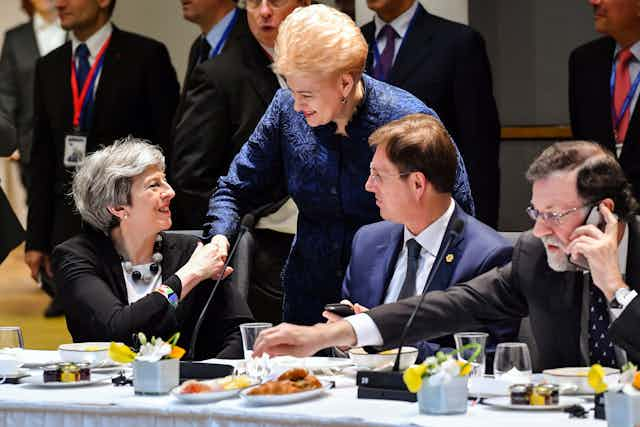The European Union enjoys a little pomp and ceremony, but one anniversary few in the EU feel like celebrating is the day marking a year since the UK triggered Article 50 of the Lisbon Treaty, formally launching the Brexit process.
In 2017, Article 50 was triggered amid speculation that the best outcome would be damage limitation for the UK and the EU member states. In an understated war of words, the UK and European elites reminded each other of their responsibilities. They warned of the damage to mutual interests if a suitable deal could not be reached. At the time, global trade and security seemed relatively stable in comparison with the EU’s problems at home. The focus was on internal concerns such as the economic fallout for the UK and the member states, whether Brexit would be the catalyst for other member states to head for the door and how Brexit might influence upcoming elections in UK, France, Germany and Italy.
One year on, the focus has shifted to an uncertain new world shaping up beyond EU borders. How will threats of a US-led global trade war and a dangerous escalation of tensions with Russia impact on the course of the Brexit process?
The pragmatic summit of March 2018
When the European Council met on March 22 and 23, the plan had been to come up with some detailed ideas about the future relationship between the UK and EU. In practice though, that was thrown into the long grass. Discussions instead focused on the increasingly uncertain external environment – including the increasingly hostile security relationship between the EU and Russia.
On March 22, the nerve gas attack on the former double agent Sergei Skripal and his daughter was elevated from a UK-Russian concern to an EU-Russian one. EU leaders stressed unqualified solidarity with the UK over the Salisbury attack. The European Council concluded that the Russian Federation was highly likely to have been responsible for the attack and condemned the use of chemical weapons under any circumstances. Follow up actions are to include a review of EU delegation staff in Russia and measures to strengthen the EU’s resilience to chemical, biological, radiological and nuclear-related risks – all in conjunction with NATO. Together, this amounts to a significant statement of intent to the outside world that the UK and EU member states will continue to work in close cooperation on security and terrorism issues.
The other major topic under discussion in Brussels is the new US tariffs policy.

EU leaders reconfirmed their commitment to the free trade principles of the World Trade Organisation (WTO) and simultaneously spoke out against the US decision to impose import tariffs on steel and aluminium. President Donald Trump has already announced tariffs on up to US$60 billion in Chinese imports. So far, the Chinese response has been muted, but the US initiative has raised concerns in Europe of a global trade war. The EU remains exempt from the tariffs until May 1 but EU leaders are calling for that exemption to be made permanent. This issue is so important for a post-Brexit partnership that the EU leaders have included the UK prime minister, Theresa May, in their discussions on contingencies in the event of a trade war.
Global uncertainty
What does Brexit mean for the UK and for Europe in an increasingly uncertain world? The year since Article 50 was triggered has witnessed growing animosity between the partners. The snail’s pace progress of the talks has at times left the prospect of any Brexit deal hanging by a thread. However, the sober reflection at the March 2018 Summit has engendered a new solidarity and a new political will for a constructive resolution.
The guidelines agreed on the transition deal demonstrate a genuine willingness on the part of the UK to compromise on interests such as the functional trading status of Northern Ireland and the fisheries sector in order to keep the process on the road.
There has been a growing awareness in Europe and in the UK of the value of their partnership. Without a constructive deal, both partners will be left vulnerable in key areas such as international trade, nuclear safeguarding, data exchange, aviation and internal security. Of course, the concessions made to date are contentious and political will is in itself not sufficient to guarantee a successful deal. For the time being though, both sides are happy to demonstrate a united face to the outside world.

